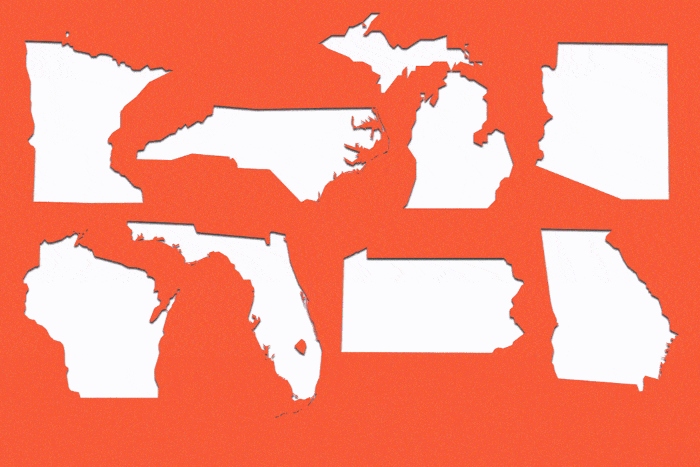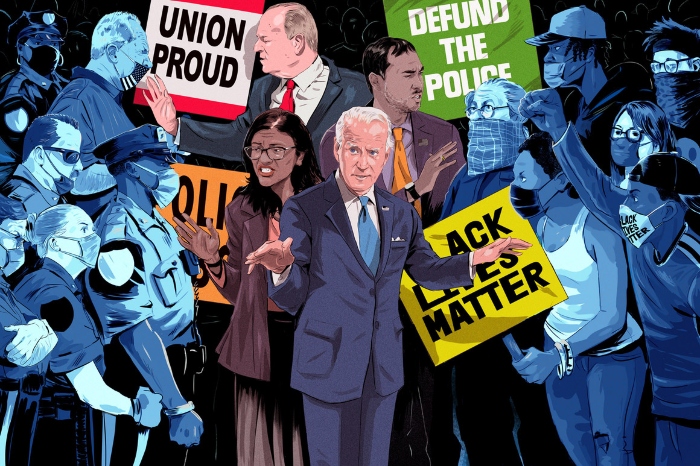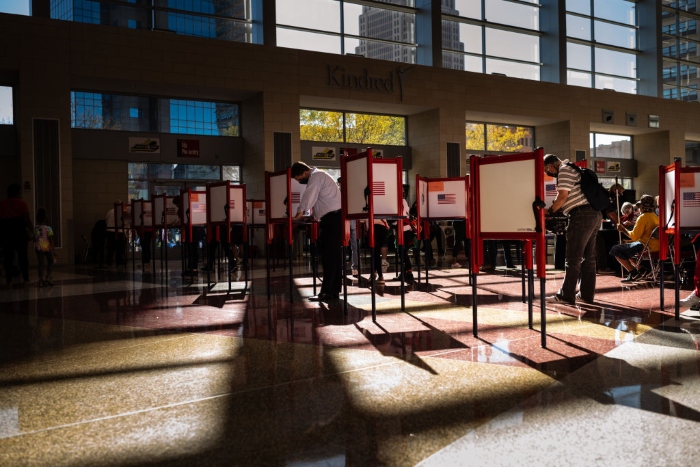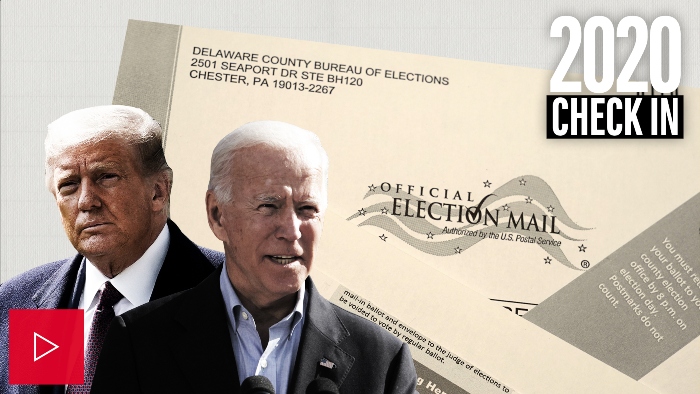It's Live on the HomePage Now:
Reader Supported News
FOCUS: An Open Letter to Judge Amy Coney Barrett From Your Notre Dame Colleagues
Supreme Court nominee Judge Amy Coney Barrett gives her opening statement during the Senate Judiciary Committee confirmation hearing in the Hart Senate Office Building on October 12, 2020, in Washington, DC. (photo: Erin Schaff/Getty)
University of Notre Dame Faculty Members
Excerpt: "It is vital that you issue a public statement calling for a halt to your nomination process until after the November presidential election."
 ear Judge Barrett,
ear Judge Barrett,We write to you as fellow faculty members at the University of Notre Dame.
We congratulate you on your nomination to the United States Supreme Court. An appointment to the Court is the crowning achievement of a legal career and speaks to the commitments you have made throughout your life. And while we are not pundits, from what we read your confirmation is all but assured.
That is why it is vital that you issue a public statement calling for a halt to your nomination process until after the November presidential election.
We ask that you take this unprecedented step for three reasons.
First, voting for the next president is already underway. According to the United States Election Project (https://electproject.github.io/Early-Vote-2020G/index.html), more than seven million people have already cast their ballots, and millions more are likely to vote before election day. The rushed nature of your nomination process, which you certainly recognize as an exercise in raw power politics, may effectively deprive the American people of a voice in selecting the next Supreme Court justice. You are not, of course, responsible for the anti-democratic machinations driving your nomination. Nor are you complicit in the Republican hypocrisy of fast-tracking your nomination weeks before a presidential election when many of the same senators refused to grant Merrick Garland so much as a hearing a full year before the last election. However, you can refuse to be party to such maneuvers. We ask that you honor the democratic process and insist the hearings be put on hold until after the voters have made their choice. Following the election, your nomination would proceed, or not, in accordance with the wishes of the winning candidate.
Next, the late Justice Ruth Bader Ginsburg’s dying wish was that her seat on the court remain open until a new president was installed. At your nomination ceremony at the White House, you praised Justice Ginsburg as “a woman of enormous talent and consequence, whose life of public service serves as an example to us all.” Your nomination just days after Ginsburg’s death was unseemly and a repudiation of her legacy. Given your admiration for Justice Ginsburg, we ask that you repair the injury to her memory by calling for a pause in the nomination until the next president is seated.
Finally, your nomination comes at a treacherous moment in the United States. Our politics are consumed by polarization, mistrust, and fevered conspiracy theories. Our country is shaken by pandemic and economic suffering. There is violence in the streets of American cities. The politics of your nomination, as you surely understand, will further inflame our civic wounds, undermine confidence in the court, and deepen the divide among ordinary citizens, especially if you are seated by a Republican Senate weeks before the election of a Democratic president and congress. You have the opportunity to offer an alternative to all that by demanding that your nomination be suspended until after the election. We implore you to take that step.
We’re asking a lot, we know. Should Vice-President Biden be elected, your seat on the court will almost certainly be lost. That would be painful, surely. Yet there is much to be gained in risking your seat. You would earn the respect of fair-minded people everywhere. You would provide a model of civic selflessness. And you might well inspire Americans of different beliefs toward a renewed commitment to the common good.
We wish you well and trust you will make the right decision for our nation.
Yours in Notre Dame,
John Duffy, English
Douglass Cassel, Emeritus, Law School
Barbara J, Fick, Emerita, Law School
Fernand N. Dutile, Professor of Law Emeritus
Joseph Bauer, Emeritus, Law School
Jimmy Gurulé, Professor of Law.
Thomas Kselman, Emeritus, History
Catherine E. Bolten, Anthropology and Peace Studies
Karen Graubart, History and Gender Studies
Margaret Dobrowolska, Physics
Aedín Clements, Hesburgh Libraries
Cheri Smith, Hesburgh Libraries
Antonio Delgado, Physics
Atalia Omer, Peace Studies
Eileen Hunt Botting, Political Science
Jason A. Springs, Peace Studies
David Hachen, Sociology
Manoel Couder, Physics
Jacek Furdyna, Physics
Carmen Helena Tellez, Music
Kristin Shrader-Frechette, Biological Sciences, Philosophy
John T. Fitzgerald, Theology
Debra Javeline, Political Science
Philippe Collon, Physics
Cara Ocobock, Anthropology
Amy Mulligan, Irish, Medieval Studies and Gender Studies
Stephen M. Fallon, Program of Liberal Studies and Dept of English
Jessica Shumake, University Writing Program and Gender Studies
Mandy L. Havert, Hesburgh Libraries
Dana Villa, Political Science
Stephen M. Hayes, Emeritus, Hesburgh Libraries
Catherine Perry, Emerita, Romance Languages & Literatures
Olivier Morel, Film, Television, and Theatre.
Darlene Catello, Music
Encarnación Juárez-Almendros, Emerita, Romance Languages & Literatures
James Sterba, Philosophy
Laura Bayard, Emerita, Hesburgh Libraries
Susan Sheridan, Anthropology
Mary E. Frandsen, Music
Mark Golitko, Anthropology
Christopher Ball, Anthropology
Gail Bederman, History
G. Margaret Porter, Emerita, Hesburgh Libraries
Cecilia Lucero, Center for University Advising
Peri E. Arnold, Emeritus, Political Science
Amitava Krishna Dutt, Political Science
Julia Marvin, Program of Liberal Studies
Julia Adeney Thomas, History
Michael C. Brownstein, East Asian Languages & Cultures
Christopher Liebtag Miller, Medieval Institute
Maxwell Johnson, Theology
John Sitter, Emeritus, English
Robert Norton, German
Hye-jin Juhn, Hesburgh Libraries
Denise M. Della Rossa, German
Sotirios A. Barber, Political Science
Pamela Robertson Wojcik, Film, TV and Theatre
Jeff Diller, Mathematics
Ann Mische, Sociology and Peace Studies
Zygmunt Baranski, Romance Languages & Literatures
Robert R. Coleman, Emeritus, Art History
William Collins Donahue, German, FTT, & Keough
Sarah McKibben, Irish Language and Literature
George A. Lopez, emeritus, Kroc Institute
Mark Roche, German
Nelson Mark, Economics
Vittorio Hosle, German, Philosophy and Political Science
Tobias Boes, German
A. Nilesh Fernando, Economics
Fred Dallmayr, Emeritus, Philosophy and Political Science
Greg Kucich, English
Kate Marshall, English
Mark A. Sanders, English
Christopher Hamlin, History
Meredith S. Chesson, Anthropology
Ricardo Ramirez, Political Science
Stephen Fredman, Emeritus, English
Dan Graff, History and the Higgins Labor Program
Henry Weinfield, Program of Liberal Studies (Emeritus)
Mary R. D’Angelo, Theology (Emerita)
Asher Kaufman, Kroc Institute, History
Stephen J. Miller, Music
Janet A. Kourany, Philosophy and Gender Studies
Michelle Karnes, English
Jill Godmilow, Emerita, Film, Television & Theatre
Mary Beckman, Emerita, Center for Social Concerns
Clark Power, Program of Liberal Studies
Richard Williams, Sociology
Benedict Giamo, Emeritus, American Studies
Ernesto Verdeja, Political Science and Peace Studies
Catherine Schlegel, Classics
Margaret A. Doody, English, Professor Emerita
Marie Collins Donahue, Eck Institute of Global Health
David C. Leege, Emeritus, Political Science









 ote: Zach D. Roberts is either the most courageous member of the Palast Investigations team or the craziest, or both. For the past two years, photojournalist Roberts has been investigating the ultra-Right, traveling–sometimes openly, sometimes under cover–with the Proud Boys and other wannabe storm troopers. It was Roberts who took those horrific photos of neo-Nazis beating a Black school teacher, DeAndre Harris, nearly to death. Filming the perpetrators while a gun was pointed at him, Zach’s photos put five neo-Nazis behind bars.
ote: Zach D. Roberts is either the most courageous member of the Palast Investigations team or the craziest, or both. For the past two years, photojournalist Roberts has been investigating the ultra-Right, traveling–sometimes openly, sometimes under cover–with the Proud Boys and other wannabe storm troopers. It was Roberts who took those horrific photos of neo-Nazis beating a Black school teacher, DeAndre Harris, nearly to death. Filming the perpetrators while a gun was pointed at him, Zach’s photos put five neo-Nazis behind bars.